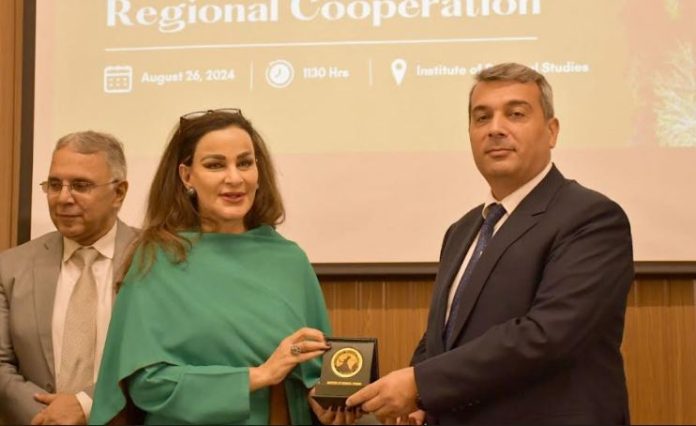Ambassador Jauhar Saleem, President of IRS, stressed the necessity of cooperation in the face of global threats, particularly climate change. He noted that climate change transcends borders and has the potential to serve as “low-hanging fruit” in diplomatic negotiations, as it presents a common threat that all parties can rally around
Faisal Sheikh
ISLAMABAD, AUG 26: /DNA/ – Senator Sherry Rehman issued an urgent warning today during a pre-COP29 seminar organised by the Institute of Regional Studies (IRS), stating that unless immediate action is taken to address the negative impacts of climate change, we will be living in a world of “want, lack, and scarcity.” In her call to action, Senator Rehman stated that the destructive power of geopolitics and hyper-nationalism, which have steered the world toward global conflict, are obscuring the imminent threat of mutually assured destruction posed by climate change.
The seminar, entitled “Strengthening Transboundary Resilience: Enhancing Regional Cooperation,” brought together several distinguished experts to discuss critical issues and potential solutions for regional climate resilience.
Keynote speaker Mr. Usman e Ghani, Additional Commissioner of Indus Waters at the Ministry of Water Resources, provided an in-depth overview of the Indus Waters Treaty. He highlighted the treaty’s various elements, from data sharing to dispute resolution, and its lasting relevance as a potential mechanism for transboundary water resilience. Mr. Ghani said that the treaty could become a powerful tool for cooperation if both sides fully committed to its implementation.
Ambassador Khazar Farhadov, Azerbaijan’s ambassador to Pakistan and the session’s chair, expressed optimism about the upcoming COP29, hosted by Azerbaijan. He emphasised the importance of global solidarity, the mobilisation of international climate finance, and the need for an inclusive process, stating that COP29 will be the most “significant international event of 2024.”
Dr. Samuel Rizk, UNDP country representative, addressed the pressing issue of water scarcity, describing it as a defining global challenge. He stressed that water scarcity is a “zero-sum game” and that the central goal of climate diplomacy should be to identify scenarios where all parties can benefit to create win-win situations.
Dr. Najibullah Sadid, an independent scholar with experience at the Federal Waterways Engineering and Research Institute (BAW), discussed Afghanistan’s water issues, including water quality and connectivity with Central Asian states. He called for a long-term vision in policymaking, criticising the current short-sighted approaches in the region.
Ms. Farrah Naz, country director of the Global Alliance for Improved Nutrition (GAIN), highlighted the agricultural challenges facing South Asia, which is already home to 40 per cent of the world’s poor and malnourished. She warned that climate change is projected to reduce crop production by 10-40 per cent in the region by the end of the century, exacerbating food insecurity. Urbanisation, rising sea levels, and increasing soil salinity are all contributing to the region’s growing challenges.
In his remarks, Ambassador Jauhar Saleem, President of IRS, stressed the necessity of cooperation in the face of global threats, particularly climate change. He noted that climate change transcends borders and has the potential to serve as “low-hanging fruit” in diplomatic negotiations, as it presents a common threat that all parties can rally around.
Finally, Talha Tufail Bhatti, an environmental scholar leading the “Strengthening Regional Climate Resilience Program” at the IRS, said that the institute’s is looking forward to hosting more seminars of this nature, expressing the importance of continued dialogue and collaboration in the fight against climate change.












